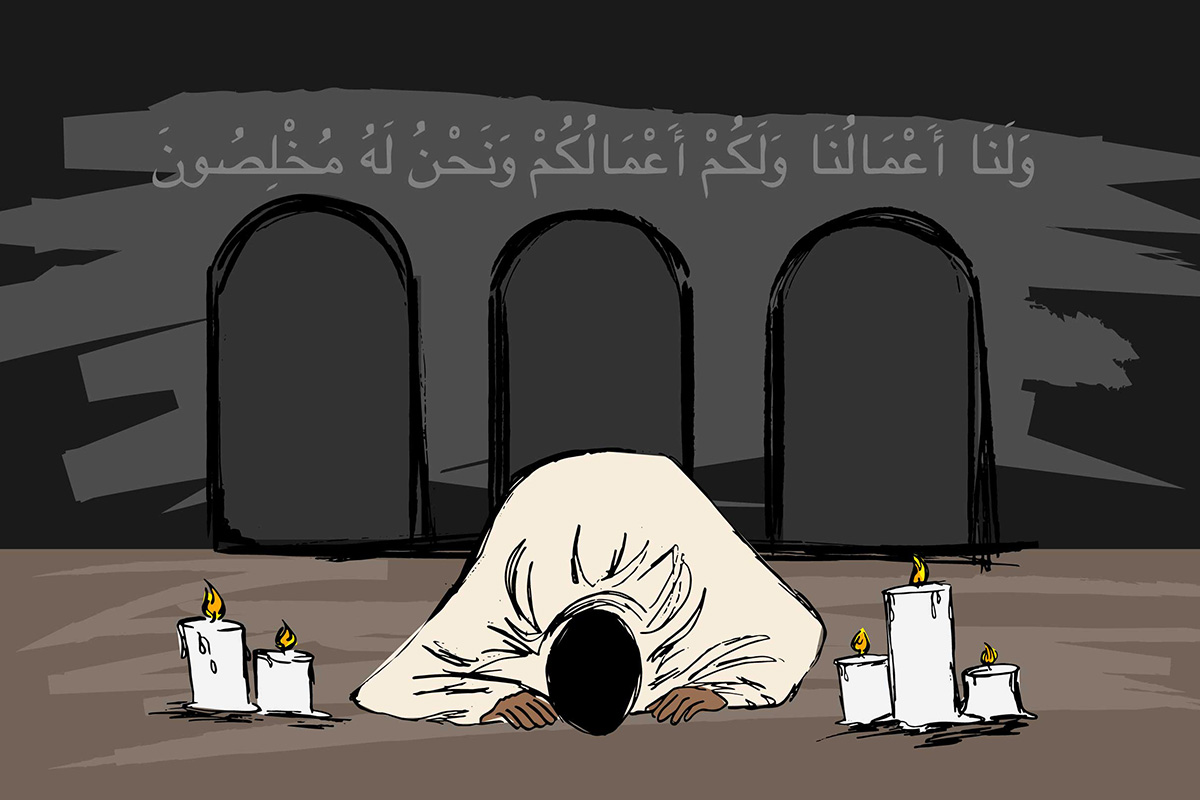The Malê Rebellion in Bahia: Brazil’s African Muslim Uprising

This Qur’anic verse translates roughly from Arabic, “And we have our responsibilities, and you have your responsibilities, and to Him we are sincere” (Qur’an 2:139). Illustration by Samantha Beach Sinagra
During the first decades of the nineteenth century, many slave rebellions took place in the province of Bahia, Brazil. Among those, the most important one was the Malê Rebellion, a religious and racial revolt against slavery and the supremacy of the Catholic religion led by African Muslims. Based in Salvador in 1835, it was by far the most important enslaved uprising in Brazilian history.
Salvador, the capital of Bahia, was the first city founded in Brazil, by Portuguese nobleman Tomé de Souza in 1548. Culturally, it has always played a prominent role in Brazil’s history. In 1835, Salvador had a population of 65,000 inhabitants, forty percent of whom were enslaved or freedmen. The black population was composed of varied African cultures and origins, including Islamic.
The Muslims not only knew how to read and write Arabic but were well versed in diverse fields of knowledge. Many were skilled craftsmen, such as shoemakers, blacksmiths, and carpenters. In the Brazilian colonial environment, this set them apart from other enslaved people who lived in permanent captivity. Some Malês were freedmen and able to earn salaries. They could move around the city with considerable liberty—although they were still victims of racism and violence. Some, economizing small financial gains, managed to buy their freedom. The Muslims were known as imalê, from a Yoruba word, which led to the name “Malê Rebellion” for the rebellion that they would lead.
The preparation meetings for the rebellion occurred in various places in Salvador, including workplaces. The Muslim leaders, including Ahuna, Pacífico Licutan, Nicobé, Dassalu, Gustard, and Luís Sanin, had raised money to buy weapons and wrote plans in Arabic.
There are indications that the Malês intended to establish an Islamic nation and to kill or enslave all non-Muslims, whether they were white, black, or mixed-race. Clearly there were tensions within the enslaved population between those born in Africa and those born in Brazil. The blacks born in Brazil, and therefore called creoles, did not participate in the revolt, although it was supported by non-Muslim blacks who practiced African religions.

The rebellion was scheduled to begin on January 25, exactly at the end of the Ramadan, the sacred month of the Muslims. The leaders chose the day of the Lailat al-Qadr (“Night of the Glory”) festival, which commemorates the day the Qur’an was revealed to Mohammed.
Before the rebellion could erupt as planned, the leaders were betrayed. A black woman alerted local authorities about the plan, and in the middle of the night on January 24, the leaders of the rebellion were ambushed by military forces. They immediately responded with fire. The rebellion began. One of their first missions was to free Pacífico Licutan, who was jailed prior to the uprising, but they did not succeed.
Six hundred Malê warriors took to the streets of Salvador. They managed to attack the barracks that controlled the city. However, due to their inferior weaponry and outnumbered infantry, they ended up being massacred by the National Guard troops, the police, and armed white civilians who were terrified by the possibility of their success. In the combat, nine government troops and about seventy of the rebels died.
In the aftermath of the rebellion, 200 slaves were taken to court. They received different types of sentences: prison, prison with work, flogging, death, and deportation to Africa. All were savagely tortured, some even to death. More than 500 Muslim Africans were expelled from Brazil and returned to African countries. Many suspects were deported with no definitive evidence of their participation in the uprising.

Despite the massacre, the Malê Rebellion had enormous repercussions in Brazil. It demonstrated to authorities and elites the potential for contestation and rebellion against the slave regime. The Malê Rebellion was over, but insecurity and panic had taken hold of Bahia’s ruling class and lasted for quite some time. This insecurity and fear spread to other parts of the country. Over time, the uprising gained prominence on the covers of newspapers across Brazil. The rebellion became a mirror for the rest of the country’s enslaved population, triggering other conflicts.
The Malês threatened Brazil’s social structure, and their legacy lives on. Their influence can still be seen broadly in today’s Bahia. The Afro-Bahian musical and cultural group Malê Debalê (bloco afro) incarnates the Malês the best—not just in name. When they parade in the streets of Salvador during carnival, it’s proof that the spirit of the Malês are alive and in the cultural memory of Bahia.
Malê Debalê’s message—voiced primarily through their music and the theme they choose each carnival—is one of the most polemical, and socially, culturally, and politically rebellious. They denounce the murder of blacks in Brazil, today’s apartheid, police brutality, and political inequalities. Consequently, during carnival, they are strategically scheduled by the government to parade late at night, on the remote side of the carnival circuit. In that area at that time, streets are practically empty and almost nobody is there to witness their art, resistance, and protest.
Narlan Matos is a Brazilian poet with a PhD in Portuguese from the University of Illinois at Urbana-Champaign. He is one of most translated Latin American poets in the world today.
Samantha Beach Sinagra is a graphic design intern at the Smithsonian Center for Folklife and Cultural Heritage. She is pursuing her master’s degree at George Mason University in arts management.
Sources
About the Malês Rebellion, read João José Reis, Rebelião escrava no Brasil: a história do levante dos malês em 1835, São Paulo, Companhia das Letras, 2003
Décio Freitas, Insurreições escravas, Porto Alegre, Movimento, 1976
Pierre Verger, Fluxo e refluxo, capítulo IX.

